It doesn’t matter if you’re planning to spend the winter in warmer places or if you’re simply taking a short vacation: there are a few essential things you need to do in order to keep your empty house safe.
1. Replace the Batteries in the Thermostat
Changing the batteries in your thermostat can help to guarantee that your heating system is being controlled correctly at the temperature that you have it set at using the settings that you have preset. Your heating system might turn off without you noticing if the batteries in the thermostat are dead.
2. Reduce the Temperature on the Thermostat
If you are just going to be gone for a short time and you are not going to drain your water pipes, you will need to make sure that your furnace is running so that the water in your pipes does not freeze. To reduce the cost of your monthly energy bill, reduce the temperature on your thermostat to at least 60 degrees. When you set your thermostat below 60 degrees, the furnace cycles for a shorter amount of time, which prevents condensate from escaping the exhaust pipe and results in ice buildup. The ice build-up prevents your furnace from operating, resulting in “no heat” situations that can cost a lot of money to fix not only your furnace but also your pipes if the house becomes too cold.
3. Have the Air Filter of the Furnace Replaced
If you have a clean and new furnace filter, the air will be able to travel through your furnace unimpeded, which will decrease the likelihood of the equipment shutting down while you are away.
4. Remove Any Debris from the Fresh Air Intakes
If you clean out any snow or debris that may be blocking the exterior fresh air intakes on your furnace, you can ensure that it has adequate airflow and lessen the likelihood that it will turn off. Because it causes frost and ice to build up inside your heated intake vents, hoarfrost is one of the primary causes of furnace failures that occur during cold fronts in the winter. In most cases, you may wipe this out with your hands; however, on occasion, using a hairdryer to melt any ice or snow that is resistant to melting can be useful.
5. Close All of Your Water Faucets and Turn Off the Water Supply
While you’re gone, a pipe in your home could break, resulting in serious damage to both the structure and the contents of your home. Think about turning the water shut-off valve in your home so that you can stop the flow of water into your house. After you have finished with this, you should flush the toilet a few times and let the water run from your taps to clear any leftover water. This action is typically intended for snowbirds who are leaving their homes for the season, but it could be appropriate for your house depending on how long you plan to be gone. Regardless of whether you choose to turn off all of the water or not, you need to make sure that all of the taps are securely closed and that nothing is left dripping or running. Check all of the faucets.




